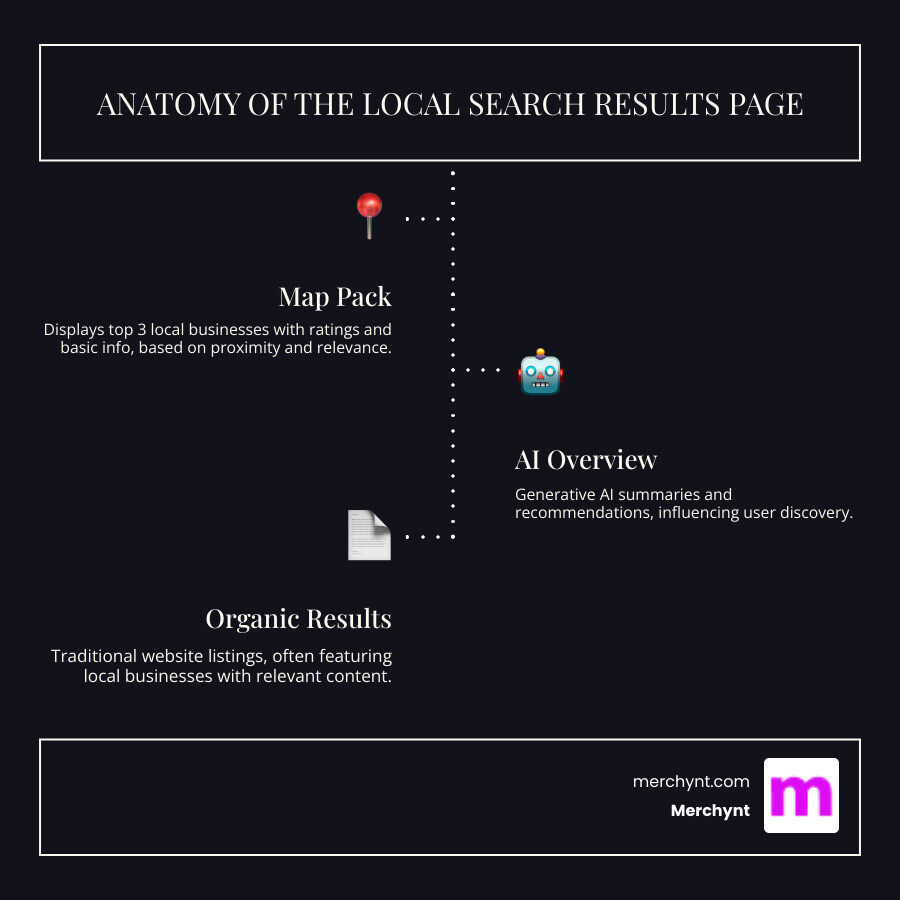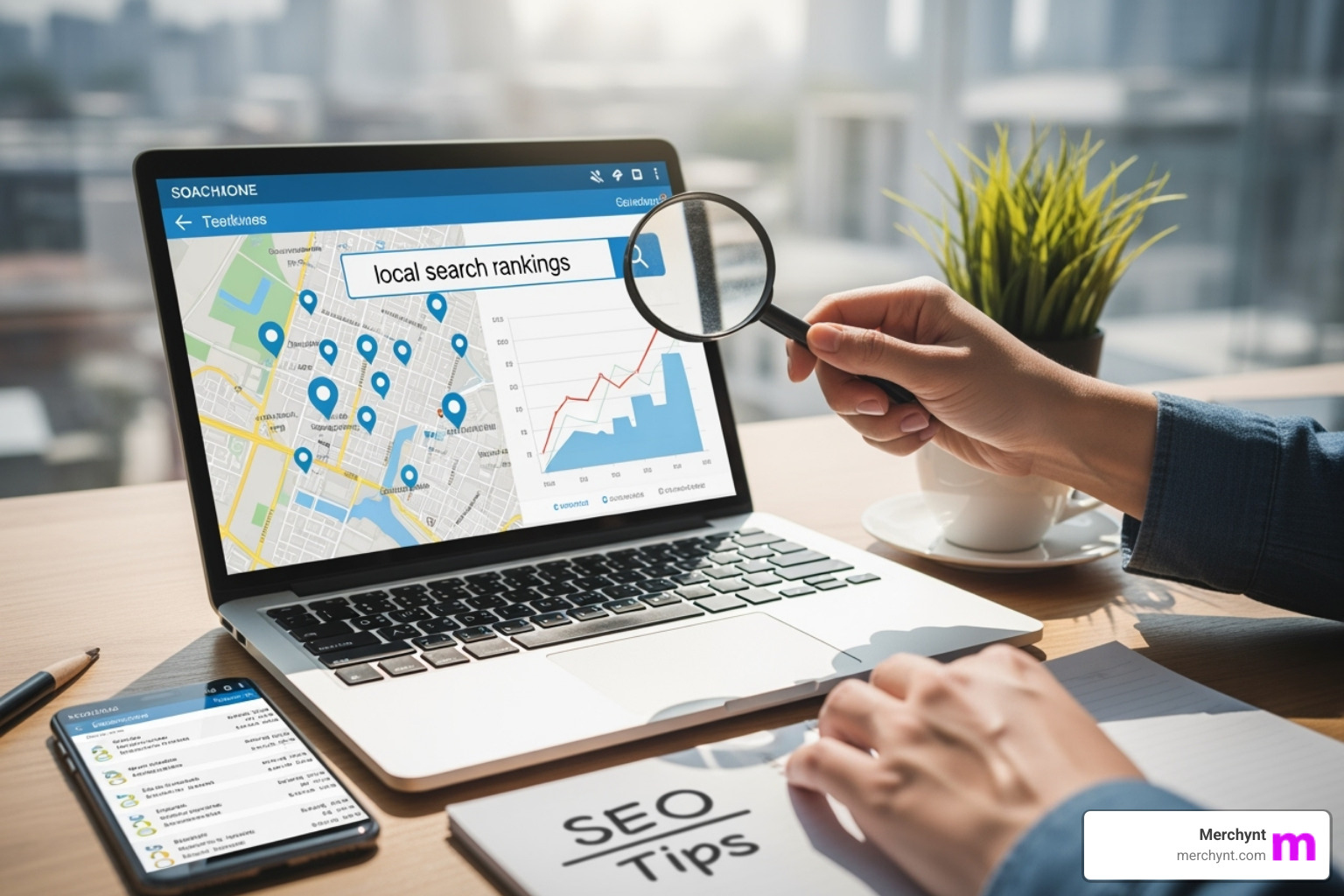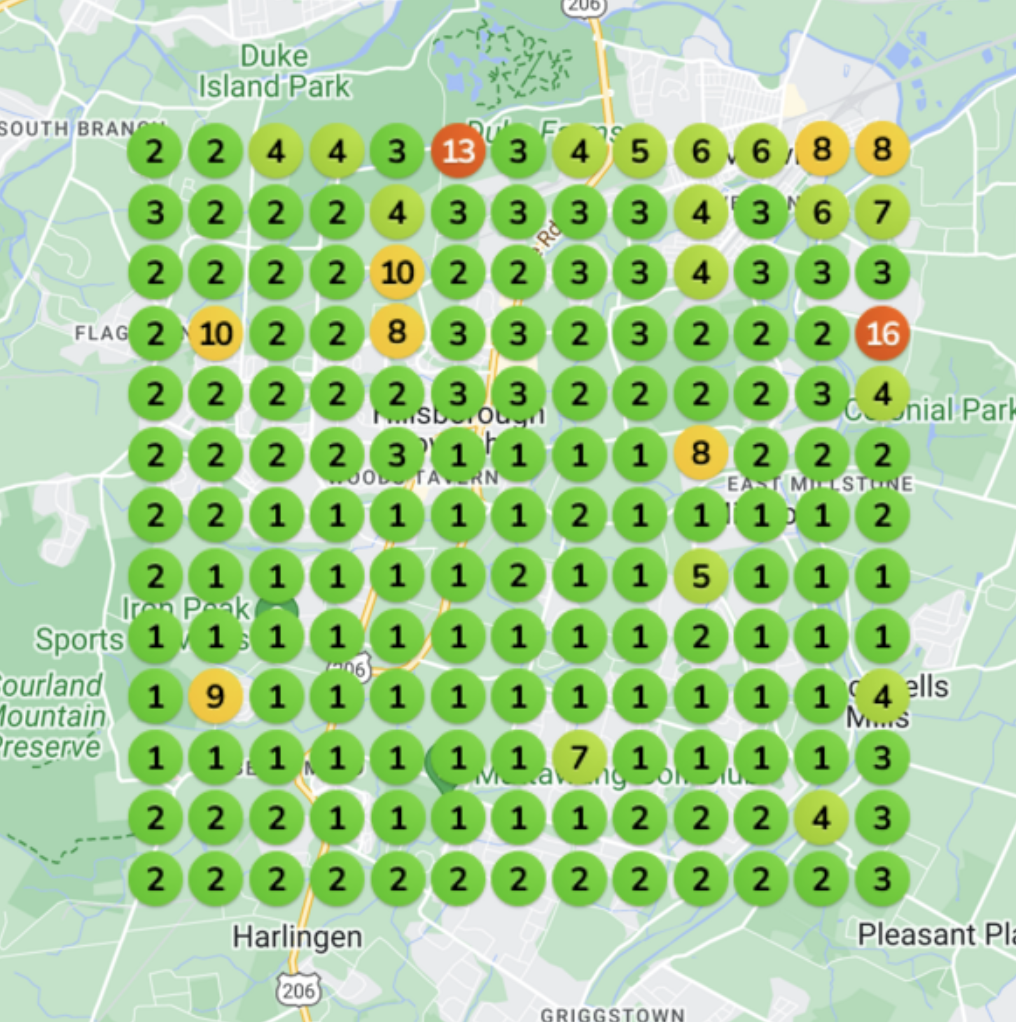
Why Local Search Visibility is Crucial in 2025
Improve local search rankings is critical for business success, as 88% of local mobile searches result in a store visit or phone call within 24 hours. Local search has the highest purchase intent; a search for "pizza near me" means a customer is ready to buy.
To improve local search rankings, focus on these core strategies:
- Optimize your Google Business Profile - Complete all sections, add photos, and maintain accurate business information
- Build a strong review profile - Encourage customer reviews and respond to all feedback professionally
- Ensure NAP consistency - Keep your Name, Address, and Phone number identical across all online directories
- Create location-specific content - Develop landing pages and content custom to your service areas
- Implement local business schema markup - Help search engines understand your business information
- Track your performance - Monitor rankings across different locations using geo-grid reporting tools
Google's algorithm now prioritizes three primary factors: relevance (how well your business matches the search), distance (proximity to the searcher), and prominence (how well-known your business is online).
The rise of AI Overviews and ChatGPT means businesses must now optimize for both traditional search and AI-powered answers. Ranking gets you "found," but quality reviews, photos, and business information get you "selected" over competitors.
I'm Justin Silverman, founder of Merchynt. I've helped over 10,000 small businesses improve local search rankings with our automated tools, including Paige, the world's first fully automated local SEO AI platform. I know what strategies move the needle.

Understanding Google's Local Ranking Factors: Relevance, Distance, and Prominence
The reason some businesses always appear first in local search isn't magic; it's Google's algorithm. Once you understand how it works, you can improve local search rankings for your own business.

According to Google's explanation of ranking factors, local search results are based on three main pillars: relevance, distance, and prominence. You need to satisfy all three to win.
Relevance is straightforward: it's how well your business profile matches a search query. To improve relevance, give Google as much detail as possible. Your primary business category must be accurate, and adding secondary categories helps Google understand the full scope of your services. A detailed business description that naturally includes your services also boosts relevance.
Distance is what makes local search local. Google prioritizes businesses that are closer to the searcher's location. While you can't move your business, you must ensure your address is accurate and consistent everywhere online. For service-area businesses, clearly defining your service areas in your Google Business Profile is essential.
Prominence measures how well-known and established your business is online. Google assesses this through several signals, including the quantity and quality of your reviews. It also considers what it finds about your business across the web, such as mentions in local news, links to your website, and directory listings. Prominence rewards businesses that earn a great reputation through excellent service and smart marketing.
These three factors dynamically determine your ranking in the Local Pack (also called the Map Pack)—the top three map listings in search results. While the exact formula is a secret, businesses that excel in all three areas consistently rank higher.
The Cornerstone of Local SEO: Mastering Your Google Business Profile
Your Google Business Profile (GBP) is your digital storefront and the most critical free tool to improve local search rankings. It controls your appearance on Google Search and Maps, determining whether you appear in the coveted Map Pack. After helping over 10,000 businesses, I can confirm that mastering your GBP is essential.
Claim and Verify Your Business Listing
Before you can optimize, you must claim and verify your business listing. Verification is a crucial trust signal to Google that open ups all GBP features and is essential for ranking. Without it, you can't make the changes that matter.
Our guide on How to Improve Your Google Business Profile for Local SEO walks you through this process.
How to Fully Optimize Your GBP to Improve Local Search Rankings
Once verified, optimize every field to tell Google when to show your business to customers.
- NAP consistency: Your Name, Address, and Phone number must be identical everywhere online. Inconsistencies confuse Google and hurt your rankings.
- Business categories: Choose a specific primary category (e.g., "Italian Restaurant" not "Restaurant") and add 2-3 relevant secondary categories to capture all your services.
- Business description: Write a compelling description that naturally includes key services and local keywords. Avoid keyword stuffing.
- Attributes: Fill out all applicable attributes (e.g., "free Wi-Fi," "outdoor seating") to match specific customer searches.
- High-quality photos and videos: Profiles with photos receive 42% more requests for driving directions. Add high-quality images of your logo, location, products, and team.
- Google Posts: Use Posts to share updates, special offers, and events directly on your profile to keep it fresh.
- Monitor your Q&A section: Proactively monitor and answer questions in the Q&A section to control the narrative.
Managing this can be overwhelming, which is why our AI platform, Paige, handles these optimizations automatically. You can also use our Google Business Profile SEO Audit to find areas for improvement.
The Power of Reviews: Managing Your Online Reputation

Reviews are critical for local SEO success and a major ranking factor. Google evaluates review quantity, velocity (frequency), and sentiment (positivity). A steady stream of positive reviews signals a popular, active business, which directly impacts your prominence.
Responding to every single review is non-negotiable. Google confirms responding helps rankings. A professional response shows both Google and potential customers that you care about the customer experience.
Reviews also heavily influence customer decisions. Research shows 99% of consumers read reviews, and 51% require at least a 4-star average rating before they'll consider a business. Customer reviews also contain valuable keywords related to your services, providing additional relevance signals to Google.
We know managing reviews is time-consuming. Our guides on 5 Proven Ways to Get More Google Reviews and How Customer Reviews Affect Local SEO and Google Business Profile Rankings can help. Paige also includes robust review management features to streamline the entire process.
Advanced On-Site and Off-Site Strategies to Improve Local Search Rankings
While your Google Business Profile is central, your website and off-site signals are crucial supporting elements. To effectively improve local search rankings, Google cross-references information from your website and citations across the web to verify your business's authority and trustworthiness.
Optimize Your Website for Local Signals
Your website gives Google the deeper understanding it needs to confidently recommend you.
- Mobile-first design is essential. 61% of mobile searchers are more likely to contact a local business with a mobile-friendly site. Google uses mobile-first indexing, meaning it prioritizes your site's mobile version for ranking.
- Page speed and Core Web Vitals are critical ranking factors. Slow sites lose visitors and rank lower. Google's Core Web Vitals measure user experience factors like loading speed and interactivity.
- Location-specific landing pages are a huge opportunity. If you serve multiple areas, create unique pages for each location with local photos, testimonials, and specific details to rank in those local organic results.
- Targeting local keywords means using the phrases your customers search for. Integrate terms like "emergency plumber in Brooklyn" naturally into your page titles, descriptions, and content.
- Embed a Google Map on your contact and location pages. This helps customers and sends a clear location signal to Google.
For a deeper dive, check out our guide: The No-Bullsh-t Guide to Ranking Higher on Google Maps in 2025.
Implement Local Business Schema Markup
Schema markup is structured data that helps search engines understand your business information. While not a direct ranking factor, it can help you earn rich results (like star ratings) in search.
Use LocalBusiness schema from Schema.org to clearly define your name, address, phone number, and hours. Tools like Google's Structured Data Markup Helper can generate the code for you. Always validate your markup with Google's Rich Results Test to ensure it's implemented correctly.
Build Prominence with Local Citations and Backlinks
Google looks at your business's presence across the entire internet to gauge your prominence.
- Local citations are mentions of your Name, Address, and Phone number (NAP) on other sites like Yelp or industry-specific directories. NAP consistency is critical; even minor differences can confuse search engines and harm rankings.
- Building local backlinks means earning "votes of confidence" from other websites. You can earn them through genuine community engagement, like sponsoring local events or partnering with complementary businesses. Local PR, such as being featured in local blogs or news, can also generate valuable backlinks and build authority.
These off-site signals take time but are crucial for establishing your business as a trusted local presence. Our Google Maps Optimization Tips guide provides more strategies.
Tracking Performance and Preparing for the Future of Local Search
Improving local search rankings isn't a one-time task. It requires ongoing tracking and adaptation, especially as AI reshapes the search landscape.

How to Effectively Track Your Local SEO Performance
Local search results vary by location, so simple rank checking isn't enough. You need to track several key metrics:
- Map Pack & Organic Rankings: Monitor your position in the top three map results and the traditional organic listings below.
- Google Business Profile Insights: Track clicks, calls, and direction requests to measure real customer engagement.
- Reviews and Ratings: Continuously monitor your average rating, review velocity, and sentiment.
- Geo-grid reports: Use tools like Local Falcon to create heatmaps that visualize your rankings across your entire service area. Our Google Business Profile Heatmap Report Guide explains these reports.
- Share of Local Voice (SoLV): This metric measures your visibility in the Map Pack for target keywords, showing your share of the local search market.
Our Definitive Guide to Mastering Keyword Ranking Reports can help you make sense of these metrics.
Preparing for AI Overviews and Generative Search
AI is fundamentally changing local search. Google's AI Overviews and tools like ChatGPT now provide direct recommendations instead of just links.
- Share of AI Voice (SAIV) is a new metric that tracks how often AI tools recommend your business. It will become increasingly vital.
- Optimizing for AI means preparing for conversational queries (e.g., "best family restaurant near me"). AI synthesizes data from your GBP, website, and reviews to form its answers. A richly detailed and fully optimized GBP is critical, as every piece of information becomes fuel for AI recommendations.
- Inconsistent information across platforms can cause AI to get confused and ignore your business.
The impact of AI on marketing highlights the need for automation and adaptation. This is why we built Merchynt's Paige, our automated AI SEO tool, to keep businesses optimized for both traditional and AI-powered search.
Frequently Asked Questions about Improving Local Search Rankings
After helping over 10,000 businesses improve local search rankings with Merchynt's Paige platform, I've seen the same questions arise. Here are answers to the three most common.
What's the difference between local SEO and traditional SEO?
Traditional SEO targets a global audience (e.g., an article on "marketing strategies"), while local SEO targets nearby customers with immediate purchase intent (e.g., a search for "plumber near me").
Local SEO strategies center on your Google Business Profile, local reviews, and appearing in the Map Pack. Traditional SEO focuses more on broad content and overall domain authority. For local businesses, local SEO is often more profitable due to the high purchase intent of searchers.
How long does it take to see results from local SEO?
Meaningful improvements to improve local search rankings typically take 2 to 6 months of consistent effort. While quick fixes like completing your GBP can show results in weeks, long-term success requires time.
Your starting point and local competition are major factors. A new business in a competitive market will take longer to rank than an established business in a smaller town. Consistency is key; sporadic efforts yield poor results, while regular work creates compound growth.
Can I rank in a city where I don't have a physical address?
Yes, for service-area businesses (like plumbers or cleaners). In your Google Business Profile, you define your service areas instead of listing a physical address. The key is to then create unique, high-quality landing pages on your website for each city you serve. These pages should include local keywords and testimonials to signal relevance to Google.
For brick-and-mortar businesses (like restaurants), it's much harder. Google's Map Pack strongly favors businesses with a physical presence in the search location. However, you can still capture some organic traffic from nearby cities with targeted content and by building local backlinks from those areas.
Conclusion: Your Path to Local Search Dominance
Local search is evolving rapidly, but the businesses that consistently improve local search rankings follow a proven playbook. Your success hinges on several core pillars:
- A pristine Google Business Profile: Your digital storefront must be complete, accurate, and compelling.
- A strong reputation: Reviews are essential for rankings, customer trust, and AI recommendations.
- A well-optimized website: It must be fast, mobile-friendly, and contain location-specific content.
- Off-site authority: Build prominence through consistent citations and local backlinks.
- Diligent tracking: Use geo-grid reports and other metrics to guide your strategy.
- AI readiness: Optimize for generative search, as it's no longer the future—it's the present.
Managing these elements is a significant challenge for any business owner. That's exactly why we built Merchynt's Paige. Our AI-powered platform automates the heavy lifting of local SEO, ensuring you stay ahead of algorithm changes and AI trends.
As a Top Google Marketing company with hundreds of 5-star reviews, we deliver results. Paige is the most advanced automated AI SEO tool on the market, designed to get you found by the customers who matter most.
Don't let competitors win your customers. Take control of your local search presence.
Get a free Google Business Profile audit and see how Paige can transform your rankings. Your customers are searching right now—make sure they find you.
About Author

